Dataset Entries from this Author
Abstract—In massive Internet of Things (IoT) deployments,
the efficient allocation of computing resources to IoT devices
while preserving devices’ data poses a significant challenge.
This paper proposes a new online probabilistic model to address
uncertainties in demand and resource allocation for IoT
networks, where the task computing of requesting devices is
addressed by serving devices. The model incorporates uncertainty
and formulates an optimization problem, concerning available
- Categories:
Abstract—In recent years, there has been a significant advancement
in the field of healthcare systems with the introduction
of fifth generation cellular communications and beyond (5GB).
This development has paved the way for the utilization of
telecommunications technologies in healthcare systems with an
level of certainty, reaching up to 99.999 percent. In this paper,
we present a novel task computing framework that can address
the requirements of healthcare systems, such as reliability. In
- Categories:
Intelligence and flexibility are the two main requirements for next-generation networks that can be implemented in network slicing (NetS) technology.This intelligence and flexibility can have different indicators in networks, such as proactivity and resilience. In this paper, we propose a novel proactive end-to-end (E2E) resource management in a packet-based model, supporting NetS.
- Categories:
In this paper, we propose a novel cooperative resource sharing in a multi-tier edge slicing networks which is
robust to imperfect channel state information (CSI) caused by user equipments’ (UEs) mobility. Due to the mobility
of UEs, the dynamic requirements of their tasks, and the limited resources of the network, we propose a smart joint
dynamic pricing and resources sharing (SJDPRS) scenario that can incentivize the infrastructure provider (InP) and
mobile network operators (MNOs). Aiming to maximize the profits of UEs, MNOs and the InP under the task
- Categories:
Abstract—Network slicing (NwS) is one of the main technologies
in the h-generation of mobile communication and
beyond (5G+). One of the important challenges in the NwS
is information uncertainty which mainly involves demand
and channel state information (CSI). Demand uncertainty is
divided into three types: number of users requests, amount
of bandwidth, and requested virtual network functions workloads.
Moreover, the CSI uncertainty is modeled by three
methods: worst-case, probabilistic, and hybrid. In this paper,
- Categories:

Abstract—In this paper, we study a Deep Reinforcement
Learning (DRL) based framework for an online end-user service
provisioning in a Network Function Virtualization (NFV)-enabled
network. We formulate an optimization problem aiming is to
minimize the cost of network resource utilization. The main
challenge is provisioning the online service requests by fulfilling
their Quality of Service (QoS) under limited resource availability.
Moreover, fulfilling the stochastic service requests in a large
- Categories:

Abstract—In this paper, we study a Deep Reinforcement
Learning (DRL) based framework for an online end-user service
provisioning in a Network Function Virtualization (NFV)-enabled
network. We formulate an optimization problem aiming is to
minimize the cost of network resource utilization. The main
challenge is provisioning the online service requests by fulfilling
their Quality of Service (QoS) under limited resource availability.
Moreover, fulfilling the stochastic service requests in a large
- Categories:

Abstract—In this paper, we study a Deep Reinforcement
Learning (DRL) based framework for an online end-user service
provisioning in a Network Function Virtualization (NFV)-enabled
network. We formulate an optimization problem aiming is to
minimize the cost of network resource utilization. The main
challenge is provisioning the online service requests by fulfilling
their Quality of Service (QoS) under limited resource availability.
Moreover, fulfilling the stochastic service requests in a large
- Categories:

Abstract—In this paper, we study a Deep Reinforcement
Learning (DRL) based framework for an online end-user service
provisioning in a Network Function Virtualization (NFV)-enabled
network. We formulate an optimization problem aiming is to
minimize the cost of network resource utilization. The main
challenge is provisioning the online service requests by fulfilling
their Quality of Service (QoS) under limited resource availability.
Moreover, fulfilling the stochastic service requests in a large
- Categories:

Abstract—In this paper, we study a Deep Reinforcement
Learning (DRL) based framework for an online end-user service
provisioning in a Network Function Virtualization (NFV)-enabled
network. We formulate an optimization problem aiming is to
minimize the cost of network resource utilization. The main
challenge is provisioning the online service requests by fulfilling
their Quality of Service (QoS) under limited resource availability.
Moreover, fulfilling the stochastic service requests in a large
- Categories:

Abstract—In this paper, we study a Deep Reinforcement
Learning (DRL) based framework for an online end-user service
provisioning in a Network Function Virtualization (NFV)-enabled
network. We formulate an optimization problem aiming is to
minimize the cost of network resource utilization. The main
challenge is provisioning the online service requests by fulfilling
their Quality of Service (QoS) under limited resource availability.
Moreover, fulfilling the stochastic service requests in a large
- Categories:

Abstract—In this paper, we study a Deep Reinforcement
Learning (DRL) based framework for an online end-user service
provisioning in a Network Function Virtualization (NFV)-enabled
network. We formulate an optimization problem aiming is to
minimize the cost of network resource utilization. The main
challenge is provisioning the online service requests by fulfilling
their Quality of Service (QoS) under limited resource availability.
Moreover, fulfilling the stochastic service requests in a large
- Categories:

Abstract—In this paper, we study a Deep Reinforcement
Learning (DRL) based framework for an online end-user service
provisioning in a Network Function Virtualization (NFV)-enabled
network. We formulate an optimization problem aiming is to
minimize the cost of network resource utilization. The main
challenge is provisioning the online service requests by fulfilling
their Quality of Service (QoS) under limited resource availability.
Moreover, fulfilling the stochastic service requests in a large
- Categories:

Abstract—In this paper, we study a Deep Reinforcement
Learning (DRL) based framework for an online end-user service
provisioning in a Network Function Virtualization (NFV)-enabled
network. We formulate an optimization problem aiming is to
minimize the cost of network resource utilization. The main
challenge is provisioning the online service requests by fulfilling
their Quality of Service (QoS) under limited resource availability.
Moreover, fulfilling the stochastic service requests in a large
- Categories:

Abstract—In this paper, we study a Deep Reinforcement
Learning (DRL) based framework for an online end-user service
provisioning in a Network Function Virtualization (NFV)-enabled
network. We formulate an optimization problem aiming is to
minimize the cost of network resource utilization. The main
challenge is provisioning the online service requests by fulfilling
their Quality of Service (QoS) under limited resource availability.
Moreover, fulfilling the stochastic service requests in a large
- Categories:
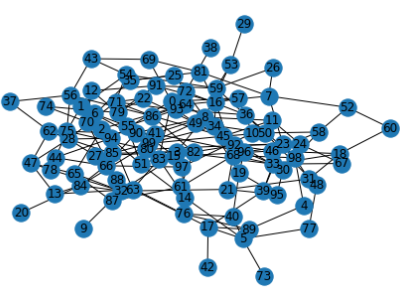
Abstract—In this paper, we study a Deep Reinforcement
Learning (DRL) based framework for an online end-user service
provisioning in a Network Function Virtualization (NFV)-enabled
network. We formulate an optimization problem aiming is to
minimize the cost of network resource utilization. The main
challenge is provisioning the online service requests by fulfilling
their Quality of Service (QoS) under limited resource availability.
Moreover, fulfilling the stochastic service requests in a large
- Categories:

Abstract—In this paper, we study a Deep Reinforcement
Learning (DRL) based framework for an online end-user service
provisioning in a Network Function Virtualization (NFV)-enabled
network. We formulate an optimization problem aiming is to
minimize the cost of network resource utilization. The main
challenge is provisioning the online service requests by fulfilling
their Quality of Service (QoS) under limited resource availability.
Moreover, fulfilling the stochastic service requests in a large
- Categories:
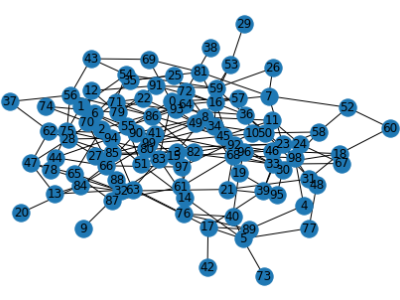
Abstract—In this paper, we study a Deep Reinforcement
Learning (DRL) based framework for an online end-user service
provisioning in a Network Function Virtualization (NFV)-enabled
network. We formulate an optimization problem aiming is to
minimize the cost of network resource utilization. The main
challenge is provisioning the online service requests by fulfilling
their Quality of Service (QoS) under limited resource availability.
Moreover, fulfilling the stochastic service requests in a large
- Categories:
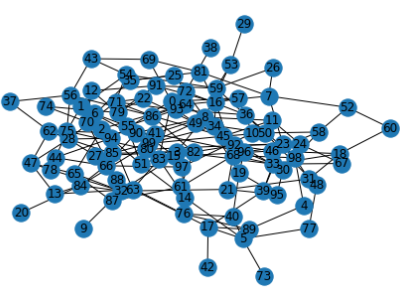
Abstract—In this paper, we study a Deep Reinforcement
Learning (DRL) based framework for an online end-user service
provisioning in a Network Function Virtualization (NFV)-enabled
network. We formulate an optimization problem aiming is to
minimize the cost of network resource utilization. The main
challenge is provisioning the online service requests by fulfilling
their Quality of Service (QoS) under limited resource availability.
Moreover, fulfilling the stochastic service requests in a large
- Categories:
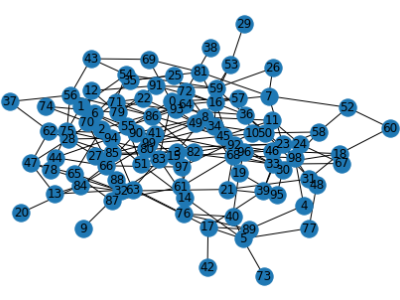
Abstract—In this paper, we study a Deep Reinforcement
Learning (DRL) based framework for an online end-user service
provisioning in a Network Function Virtualization (NFV)-enabled
network. We formulate an optimization problem aiming is to
minimize the cost of network resource utilization. The main
challenge is provisioning the online service requests by fulfilling
their Quality of Service (QoS) under limited resource availability.
Moreover, fulfilling the stochastic service requests in a large
- Categories:
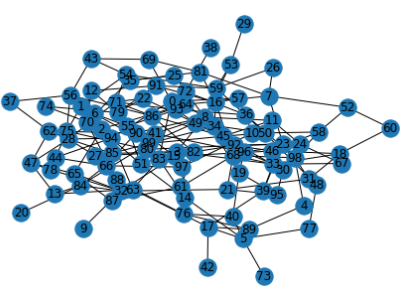
Abstract—In this paper, we study a Deep Reinforcement
Learning (DRL) based framework for an online end-user service
provisioning in a Network Function Virtualization (NFV)-enabled
network. We formulate an optimization problem aiming is to
minimize the cost of network resource utilization. The main
challenge is provisioning the online service requests by fulfilling
their Quality of Service (QoS) under limited resource availability.
Moreover, fulfilling the stochastic service requests in a large
- Categories:

Abstract—In this paper, we study a Deep Reinforcement
Learning (DRL) based framework for an online end-user service
provisioning in a Network Function Virtualization (NFV)-enabled
network. We formulate an optimization problem aiming is to
minimize the cost of network resource utilization. The main
challenge is provisioning the online service requests by fulfilling
their Quality of Service (QoS) under limited resource availability.
Moreover, fulfilling the stochastic service requests in a large
- Categories:

Abstract—In this paper, we study a Deep Reinforcement
Learning (DRL) based framework for an online end-user service
provisioning in a Network Function Virtualization (NFV)-enabled
network. We formulate an optimization problem aiming is to
minimize the cost of network resource utilization. The main
challenge is provisioning the online service requests by fulfilling
their Quality of Service (QoS) under limited resource availability.
Moreover, fulfilling the stochastic service requests in a large
- Categories:
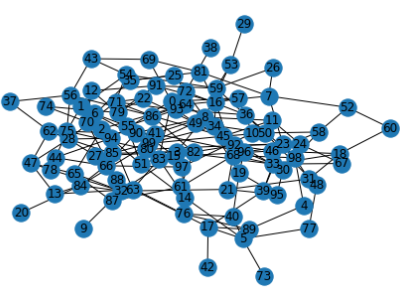
Abstract—In this paper, we study a Deep Reinforcement
Learning (DRL) based framework for an online end-user service
provisioning in a Network Function Virtualization (NFV)-enabled
network. We formulate an optimization problem aiming is to
minimize the cost of network resource utilization. The main
challenge is provisioning the online service requests by fulfilling
their Quality of Service (QoS) under limited resource availability.
Moreover, fulfilling the stochastic service requests in a large
- Categories:
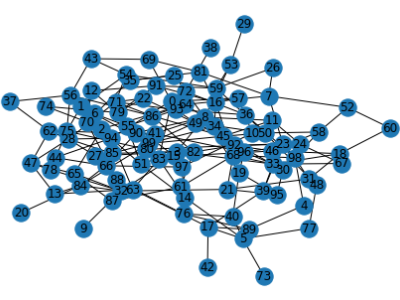
Abstract—In this paper, we study a Deep Reinforcement
Learning (DRL) based framework for an online end-user service
provisioning in a Network Function Virtualization (NFV)-enabled
network. We formulate an optimization problem aiming is to
minimize the cost of network resource utilization. The main
challenge is provisioning the online service requests by fulfilling
their Quality of Service (QoS) under limited resource availability.
Moreover, fulfilling the stochastic service requests in a large
- Categories:
